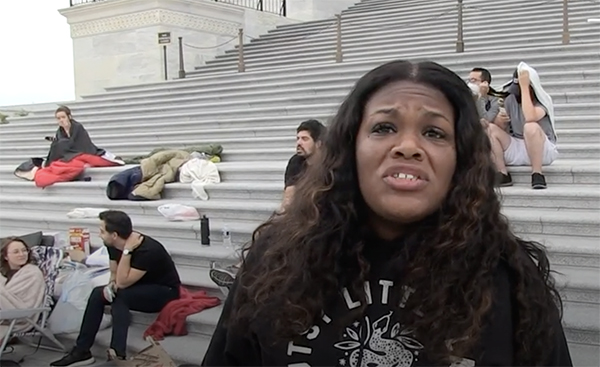
Video Still TMC
Before I came to Congress, there was a period in my life where I was unhoused and living in a car with my babies.
“There were nights where my eyes would water as I fought to stay awake, worried about what could happen to my children if I fell asleep. We can and we must build a future where nobody is unhoused.”
Those were the words of Cori Bush – nurse, pastor, and member of the US. Congress from St. Louis – explaining why she conducted a round-the-clock sit-in on the steps of the U.S. Capitol in Washington, D.C. in late July.
Bush sent a letter to every one of her Democratic colleagues in the U.S. Congress telling them that Congress should not leave Washington for its seven-week summer recess until it passed an extension of the eviction moratorium. That moratorium was set to expire, threatening 11 million people with possible eviction and even homelessness.
Bush herself has been evicted three times in her life. The first time, she was 20 years old. The second time she was 29. (She had quit a low-paying job to attend school and could no longer afford the rent.) The third time was in 2015, when she received an eviction notice prompted by her participation in protests in Ferguson, Missouri, after the killing of Michael Brown by a police officer.
On Friday, July 31, armed with an orange sleeping bag and a lawn chair, Bush began her sit-in on the steps of the U.S. Capitol building. She stayed put for five days – through rain, cold, and Washington’s brutal summer. Across the country, support began to pour in.
The sight of a working-class black woman who is member of the U.S. House of Representatives sitting in on the Capitol steps while other members of Congress fled town for a seven-week vacation was just too dramatic for even the corporate media to ignore.
Conceding to massive public pressure, on Tuesday, Aug. 3, the Centers for Disease Control announced a new order barring people from being evicted in states experiencing a “substantial” spread of the coronavirus. This order covers about 80 percent of American states and 90 percent of the U.S. population. The order will expire on Oct. 3.
Despite claims that nothing could be done to stop evictions, Cori Bush’s brave stand forced the issue into the public consciousness and produced results. Her protest was part and parcel of a movement for housing that predated her sit-in, but her action also helped galvanize and develop that movement. More such boldness will be needed soon — and more such combined action of social activists and progressive elected officials. While the new ban on evictions is unquestionably a victory, it is temporary.
The fight for housing will continue. That fight has to be waged through protests in the streets, speeches in the halls of Congress, and — if necessary — sit-ins on the steps of the Capitol. We cannot rest until housing is recognized as a basic human right. As Representative Bush wrote: “We can and must build a future where nobody is unhoused.”

